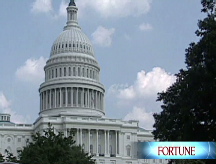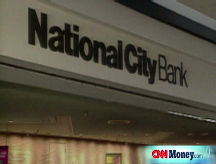Procure your piece of the bailout
The Treasury says small companies will have a shot at Emergency Economic Stabilization Act fulfillment contracts, but history suggests big businesses will be the big winners.
(CNNMoney.com) -- Lucrative government contracts are up for grabs as the Treasury Department scrambles for vendors to fulfill the provisions of the bailout bill passed earlier this month. Will small businesses get a piece of the action?
So far, the signs aren't good. While the Treasury put out a set of guidelines for small businesses that want to pursue procurement deals for the Emergency Economic Stabilization Act's implementation, early contracts have gone to large companies, and Treasury representatives aren't sure what bailout-related opportunities will actually be available for smaller firms.
"Though they may not be able to vie for the contracts that manage billions of dollars in assets, there are other duties that need to be fulfilled," said Treasury spokeswoman Jennifer Zuccarelli. "We are looking at opportunities that are specific to small businesses." When asked what those opportunities are, Zuccarelli was unable to name any specific openings.
Two early winners in bailout contracting are Ernst & Young and PricewaterhouseCoopers, which landed deals worth $492,007 and $191,470, respectively, for accounting services for the Troubled Asset Relief Program (TARP). When large vendors win government contracts, they typically subcontract pieces of the project to smaller companies to help fulfill government quotas for small business procurement. Zuccarelli said those expectations remain in place for bailout-related deals.
"We have specific requirements laid out for our big contractors that they must show us how they plan to use small/minority/women-owned business contractors. If they don't have a satisfactory plan for including small businesses, then we don't hire them," Zuccarelli said. "We are taking this requirement very seriously as we talk to applicants for the large contracts."
Representatives of Ernst & Young and PricewaterhouseCoopers declined to comment on whether the companies will work with small businesses on their TARP contracts. A spokesman at PwC said that historically the company "has partnered with small businesses in a number of contracts with the federal government, and has found those partnership arrangements to be mutually beneficial."
Under a 1997 law, the government is required to give 23% of its federal contracts to small businesses. The Treasury's goal for the 2009 fiscal year is to award 29.4% of its prime contracts and 44.7% of subcontracts to small companies. But historically, the government falls short of its targets, although the Treasury has been one of the more compliant departments: 28.8% of its contracts went to small businesses in the 2007 fiscal year, according to government reports. (The accuracy of those reports is debatable. A recent Washington Post analysis found that 6% of a sample $89 billion in contracts were given to large companies incorrectly listed as small ones.)
Sudden crises, like the financial meltdown that prompted the passage of the bailout bill, bring both opportunity and obstacles for small companies.
Disasters spark a surge of new procurement opportunities as the government marshals its resources to attack the problem. But they also demand urgent action, allowing the government to suspend its usual procurement policies and quotas. In announcing its solicitations for TARP contracts, the Treasury warned that the "unusual and compelling urgency" of the situation meant that a number of contracts would be awarded without full, open competition.
"Treasury is trying to make those opportunities available to small businesses to the extent it can, but it also has to be practical," said Richard Vacura, a government contract expert and attorney at Morrison & Foerster in McLean, Va. "Like after Katrina or in the Iraq war, the government shortcuts the processes and limits competition because it is in a great hurry to get those services."
Vacura specializes in guiding companies through the government-contracting process, and his business surges in the wake of disasters as numerous vendors chase after the sudden flood of procurement opportunities. But crisis situations can actually be the worst time to try to get a foot in the door: When the government is overwhelmed with an urgent need, it tends to turn first to vendors it already knows.
That's what happened after Hurricane Katrina devastated New Orleans. Jim Barr, chief of the contracting division for the U.S. Army Corps of Engineers' New Orleans District, says he had no time to vet new applicants.
"After Katrina, we were basically inundated with calls from businesses large and small wanting to contribute to recovery effort," he said. "We realized we could award a couple of large contracts or hundreds or thousands of smaller contracts."
Some small companies squeezed in, like Bertucci Contracting, a New Orleans construction business that landed a $5 million contract to dump stone on breached levees. But Bertucci Contracting has been contracting with the government for five decades, a track record that helped it bid and land the deal amid the chaos of an emergency situation.
"Knowing how to get paid, how to track costs, what is reimbursable - all that helped us a lot going in as small business," said Tony Zelenka, Bertucci Contracting's president. "A lot of businesses would be uncomfortable with that. For us, regulations are clear and our business is geared to working with those regulations, so we felt comfortable."
Contracting experts say such advance preparation is the best way to land deals when a crisis generates a rash of them. Being already listed in the government's Central Contractor Registration database, familiar with bid procedures, and knowledgeable about likely areas of opportunity gives companies an advantage over rivals.
For the bailout, small business proponents back the Treasury's recommendation to look for subcontracting opportunities with companies like Ernst & Young that have landed prime contracts. Even when it's not required, big companies will often seek small business partnerships to earn brownie points from the government, said Lynn de Seve, president of GSA Schedules Inc., a firm that guides businesses through the contracting process.
But other small business advocates are skeptical that any of the promised small business opportunities around the bailout will materialize.
"I've seen situations where small business agencies say there are opportunities and want them to compete, but then they have to compete with the large businesses," said Christopher Gunn, spokesman for the American Small Business League.
He's unimpressed by the government's long history of coming up short on small business contracting, and the SBA's lax oversight and enforcement. "The Treasury's inviting them may show they might be looking more towards working with small businesses," he said. "But I question if in time they can do this better than before unless authorities' feet are held to the fire." ![]()
Why TARP is full of holes
Start bidding for government contracts
The saga of the SBA and set-asides: Preferential contracting is a policy rife with logistical challenges and loopholes - but for some small firms, it's also a lifeline.
-
The Cheesecake Factory created smaller portions to survive the downturn. Play
-
A breeder of award-winning marijuana seeds is following the money and heading to the U.S. More
-
Most small businesses die within five years, but Amish businesses have a survival rate north of 90%. More
-
The 10 most popular franchise brands over the past decade -- and their failure rates. More
-
These firms are the last left in America making iconic products now in their twilight. More











